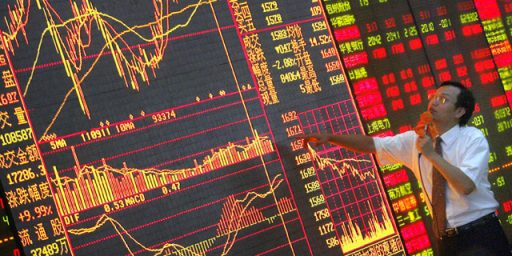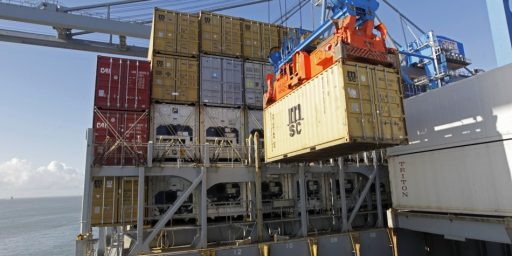Economy Slowing
Real estate construction projects are being cancelled. Consumer confidence is waning. Auto sales are tanking. There are worries about rising unemployment. The government is considering a major stimulus package. In China:
Just as China attained supercharged growth that astounded much of the world, it appears to be slowing more sharply and more quickly than anyone anticipated.
“It’s tough to be optimistic,” said Stephen Green, an economist at Standard Chartered Bank in Shanghai. “The three engines of growth — exports, investment and consumption — have all slowed down.”
The signs are so troubling that last week Prime Minister Wen Jiabao warned that this year would be “the worst in recent years for our economic development.”
It’s prudent to take Chinese government economic reports with a generous helping of salt but, when they admit that growth is slowing from the blistering 11% they saw in 2007 to a more modest 5.8% predicted for the fourth quarter of 2008, I believe them.
The cooling of the formerly red-hot Chinese economy follows declines in retail activity here and in Europe with attendant declines in orders for Chinese goods. 60% of China’s economic growth is based on exports and as demand for China’s goods slows, so does their growth. I’ve been saying for years that just as the U. S. needs to rely less on consumer spending for its prosperity so China needs to cultivate a domestic market to continue its economic growth. We’ll see what the effects of our respective failures to behave more prudently may be.
There was one item in the article cited above which gave me some foreboding: part of the stimulus package under consideration in China would be increased subsidies for exporters. Good for consumers here, very bad for producers of consumer goods here and the people employed by those companies.




It’s worse than it sounds. All the stats I’ve seen indicate that in order to provide for their own population growth & demand for new domestic jobs, China has to maintain at least an 8% annual growth rate to avoid economic contraction. If even the notoriously rosy pronouncements of the Chinese gov’t are allowing for a dip below that level, the reality may be far worse…
I’ve heard that China’s economic problems began before the global slowdown as central planning sought earlier this year to direct economic activity away from cheap products to high tech goods.
The Chinese leadership has been aware for some time that they needed to be getting into higher ticket areas. That’s why they’ve been buying all the German heavy industrial equipment which is why, in turn, Germany is nearly the only country in the world with which the Chinese run a trade deficit.
One of the higher ticket items was planned to be automobiles. If you think our domestic automobile industry has a problem now, imagine Chinese cars with a tenth of the labor costs of American ones.
Here is a link to the story I heard on NPR:
“The majority of this happened because of changes in regulations last year deliberately decided by the Chinese government in order to slow down the economy and to move away from reprocessing [and those] labor intensive, environmentally unfriendly and energy-intensive kind of companies,” Seyedin says. “And certainly some companies have suffered as a result of that. Those types of companies needed to go anyway.”
But with unemployed workers crowding the local labor exchange, some economists fear the government was too aggressive in forcing change. State-run newspapers say 20 million Chinese workers have lost their jobs in the first half of this year. China’s Communist Party has based its legitimacy on the promise of economic prosperity and rising living standards. It has kept those promises for three decades, but the perfect storm created by its own reforms and the financial turmoil overseas could mean trouble ahead.
Link
China’s problems are causing major problems in the UK recycling program:
Exercise in Applied Insanity
“What we all know is that the bulk of the so-called “recycled” material has been loaded on slow boats to China, where it has been “reprocessed” under appalling conditions, recorded many times. But as long as local authorities could get the waste off their books, honour was satisfied and quotas were deemed filled.
Now, with the Chinese economy going into freefall and manufacturers going bankrupt in droves, cheap Chinese goods are no longer pouring into the UK, so there are no empty ships to take our rubbish as ballast for the return journey.”